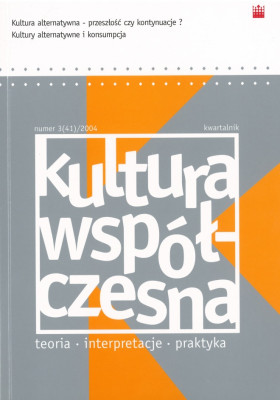Settings and search
Kultura alternatywna - przeszłość czy kontynuacje?


Wersja elektroniczna numerów archiwalnych powstała w wyniku współpracy z Biblioteką Elbląską im. Cypriana Norwida (http://www.bibliotekaelblaska.pl/).
Teorie i interpretacje
Treść pojęcia „kultura alternatywna” którym posługiwały się społeczności alternatywne lat siedemdziesiątych uległa zmianom wraz z głębokimi przemianami politycznymi i kulturowymi jakie zaszły w końcu XXw. W artykule tym polemizuję z tezą iż w globalizującym się świecie ponowoczesnym pojęcie „kultury dominującej” straciło sens. W rzeczywistości współczesnej opisuje ono nowe podziały i ujawnia nowe problemy społeczne. Ruchy alternatywne XXI w. są bardzo zróżnicowane, zarówno ze względu na zainteresowania, rodzaje więzi i strategie działania jak i stopień radykalizmu. Zaliczam do nich wszelkie społeczności odkrywające nowe formy dominacji kulturowej i wykluczenia lub też braki, „puste miejsca” tam, gdzie kultura dostarczać powinna odpowiedzi na ważne, egzystencjalne pytania. Kulturę alternatywną tworzą więc grupy wielorakie - od radykalnych odłamów ruchów alterglobalizacyjnych, poprzez różne rodzaje grup twórczych do wspólnot o charakterze religijno-terapeutycznych. Cechą charakterystyczną i najważniejszą jest tu praktyka rozumiana nie jako dążenie do rewolucyjnej zmiany, lecz podjęcie jakiejś próby kreowania własnego świata w ramach istniejącego układu.
In his discussion of the album of Kury – a band belonging to so-called jass-scene – the author analyses three basic components of its ideological and aesthetic message: cover, music and lyrics. Each of the above elements is related to so-called ‘dominant culture’ whose presumptions are presented in the first part of the article. The alternative character of the album, reflected by both: music and cover, is due to the fact that it radically differs from the aesthetics dominating Polish music market. The alternative character of the verbal component of the album bases on direct critique of the ‘dominant culture’ and stiff resistance towards it.
The author aims at defining the notion of ‘alternative theatre’ founding her argument not on the opposition: alternative theatre – institutional theatre, but on sociological research on alternative culture and society. At the same time she reconstructs some discussions of theatre theoreticians and practitioners concerning the notion of the ‘alternative’ in theatre. The article ends with an overview of groups and performances crucial for the alternative theatre after 1989.
The article describes the activity of the Green Federation (FZ), which from its very origins (1988) till today, has defined its character as alternative and counter-cultural. Within the Polish ecological movement therefore, FZ is perceived as a unique organisation. The author concentrates on the evolution of FZ and its history. He analyses the programme and some major actions of FZ. A separate part of the text is concentrated on the question of why one of the biggest ecological groups in Poland in nineties has been lately so strongly marginalised.
Few years ago no one imagined that rap music could enter the Polish music scene. Both culturally and politically engaged, rap music was the voice of revolt and opposition of African Americans against the white authority. In Poland, it became the voice of the young generation living in a democratic country.
